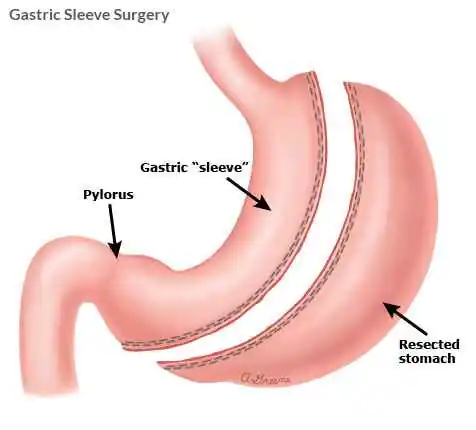All Insurance Covered
( Cashless / Reimbursement )



















Sleeve Gastrectomy Surgery
In this surgery stomach (bag shaped organ where food is stored as we eat food) size is reduced by removing excess stomach and leaving behind a sleeve of stomach. Top most part of stomach is called fundus of stomach and has hunger hormones (mainly Ghrelin Hormone). As patient gains weight, stomach size also increases and hunger hormones also increase. Surgery decreases the hunger (as whole of fundus is removed) as well as eating capacity. This reduced intake of food along with rapid movement of food from the stomach leads to weight loss. It also helps in resolving other problems such as diabetes, high blood pressure, joint pain, and more.


Advantages of Sleeve Gastrectomy Surgery
Our hospital ensures a pristine environment for your well-being
Our hospital has advanced technology gadgets and the future with the power of modern technology
Elevating healthcare to new heights at high standard hospital and your well being

Laparoscopic Sleeve Gastrectomy
Laparoscopic Sleeve Gastrectomy (or sometimes referred to as Vertical Sleeve Gastrectomy), is the most common type of Bariatric Operation at this time. It is primarily done for weight loss in obese patients and now being done world over by Laparoscopic method (Key Hole Surgery) which avoids any big cuts on abdomen and ensures quick recovery. Obese people tend to have bigger stomach due to chronic intake of excess food and about 80% of the stomach is removed in this procedure thereby leaving a sleeve shaped tube of stomach (thereby giving its name).
Removing this much amount of stomach leads to multiple beneficial effects like-

Who should consider this surgery
Like other Bariatric Surgeries, Sleeve Gastrectomy is typically advised when one suffers from Morbid Obesity (BMI over 32.5 for Indians and other Asians). It can help you lose weight if other methods are not giving or maintaining results. Remaining obese can lead to many potentially life-threatening conditions like:
Diet after Sleeve Gastrectomy:
It is recommended that you eat healthy diet after any kind of Weight Loss Surgery and not repeat the same mistakes with diet as in past. Diet should be:
High in protein
Low in fat and sugar
You should eat small regular meals and avoid snacking. Your Bariatric Surgeon and his team will guide you through various stages of diet after surgery. Liquid diet is recommended for first few days after surgery which is gradually changed to normal consistency diet as per your recovery and tolerance.
You are also asked to take multivitamins and calcium after surgery.
Excercise after Sleeve Gastrectomy:
Light activity is started right on the day of surgery. Patient is allowed to move around in room and corridors of hospital on evening of surgery till discharge in one or two days. Thereafter one can do light work like taking care of one self, walking in a park, climbing stairs etc. Heavy weight lifting is usually avoided till 30 to 45 days from surgery for the risk of hernia formation. Thereafter one can join gym if desired or do other strenuous activities like sports etc. if one is interested otherwise a minimum level of activity like daily walking is recommended. Your doctor will advice you further depending upon you age, health and your capacity to do exercise.
How to proceed:
After you have made your mind to get out of obesity and start a new life, you should visit a Bariatric Surgery Hospital and get yourself examined. Their team will evaluate you condition and guide you how to proceed. Some blood are usually done before surgery like:
Blood Tests
Ultrasound of abdomen
Endoscopy (optional)
ECG
Xray Chest
Echocardiagraphy (optional)
Colour Doppler of legs (optional)
You are likely to be examined by some other doctors as well like cardiologist, anaesthesiologist, pulmonologist etc. but it differs from case to case.
It is recommended to visit your doctor empty stomach on the morning of your appointment so that all tests can be done same day if you are willing. Otherwise you may have to wait till afternoon or visit some other day for tests which require you to be empty stomach.
It is also recommended to quit smoking and alcohol for at least 4 weeks prior to surgery and stop or decrease them after surgery.
Course in the hospital
You are likely to be admitted a day before surgery so that you are comfortable staying in the hospital and all necessary arrangements are in place before you are shifted to operation theatre for surgery.
I/V catheter will be inserted (which is used to give fluids routinely). Once inside operation theatre, anaesthetist will give some drugs to make to sleep and you will not come to know anything about the surgery.
Surgery involves small cuts on abdomen and these days no big cut of open surgery is needed making surgery more cosmetic, less painful and recovery is also very quick. Procedure lasts anywhere between 45 minutes to 2 hours.
By the time patient is awake, surgery is entirely complete.
You will be asked to start walking in the evening and doctor may allow you to start taking oral liquids same evening or next day morning. You may be shifted back to your room directly or may be kept in ICU for observation depending upon your recovery. Most patients are able to go home in one to two days after surgery.
Risks
As with any other major surgery, sleeve gastrectomy also has certain risks involved like:
Very rarely, complications of sleeve gastrectomy can be fatal.
Course after Surgery:
You will be happy to see rapid and sustained weight loss happening to you which you have not experienced ever before. But as body starts to accept this weight loss, one may feel the following on certain days during first few months:
These are usually short lasting and improve on their own
Results
Results of any weight loss surgery vary depending upon a lot of factors but if you follow advice of your doctor well and live a healthy life-style, you can expect to lose most of your excess weight in 6 months to two years and main it as well.
In addition to weight loss, sleeve gastrectomy may improve or resolve conditions related to being overweight, including:
Sleeve gastrectomy surgery can also improve your ability to perform routine daily activities, and can help improve your quality of life.
What not to do after any weight loss surgery:
Frequent snacking
High calorie diet especially liquids
No physical activity
Missing follow-up with your doctor

After 4 – 6 weeks petient will return to your normal activities.
Not everyday, you could lose 5 pound weight in a week
EXCELLENTTrustindex verifies that the original source of the review is Google. Thank you doctor Mandeep Kaur. I had a Positive result after 2 weeks of my IUI I am so happy I was waiting for so long to concive and to see 2 lines on my pregnancy test but every time that was unsuccessful but this was my first try with IUI and that’s go successfully thank you so much. 😊😊Posted onTrustindex verifies that the original source of the review is Google. Great experience with Dr. Mandeep and staff of the hospital.Posted onTrustindex verifies that the original source of the review is Google. My experience is very goodPosted onTrustindex verifies that the original source of the review is Google. Great Staff With good facilitiesPosted onTrustindex verifies that the original source of the review is Google. Thank you so much Dr mandeep from the bottom of hearts for taking such good care. Because of your professionalism and great smiles, we felt like we were in good hands and that gave us peace of mind towards the big day.Posted onTrustindex verifies that the original source of the review is Google. I got my friend’s weight loss surgery done at Star Hospital. We were impressed by Dr Ahluwalia’s clarity of thought on weight loss and Bariatric Surgery. We visited some other hospitals before and were always confused as their versions were very different but here we got answers to all our questions in a very clear way and my friend could gather courage to finally get his Bariatric Surgery done and start living a normal life again. Procedure went smooth as was told and we were out out of hospital very next day. Now we regret delaying this for years!Posted onTrustindex verifies that the original source of the review is Google. Dr Mandeep is a very hardworking and nice doctor.my result came positive and I'm very thankful to mam and all the staff members 🙏🙏